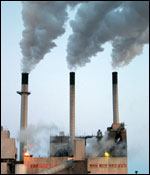
Is this power plant in trouble? Nah.
Photo: USGS.
What’s this on the wires? The U.S. EPA is gearing up to prosecute a new batch of new-source review (NSR) cases against polluting power plants? Could it be that the Bushies have suddenly taken a keen interest in enforcing a Clean Air Act rule that they have gone to great lengths to weaken?
Not really.
The story goes like this: Greenwire reporter Darren Samuelsohn recently got ahold of an EPA document containing a list of 22 electric utilities that in the last five years have allegedly run afoul of NSR by making upgrades to their facilities without installing the required pollution controls. Greenwire published a story saying the utilities could face enforcement actions, and other news outlets followed suit.
According to Eric Schaeffer, a former top enforcement official at the EPA who left in protest over air-enforcement lapses under Bush, the publicity was not welcome news to EPA Administrator Mike Leavitt: “The word inside the agency is that Leavitt is apparently furious that this news is out. It’s not likely that this indicates that the agency is doing some kind of election-year crackdown on utilities. In fact, it’s a political embarrassment — it just shows how the administration is holding up prosecutions recommended by its own staff.”
Between 1999 and 2001, the Clinton EPA filed cases over alleged NSR violations at 51 power plants owned by nine utilities. Though several of these cases have been settled, most are still hanging in limbo, having stalled out under the Bush administration.

Jeffrey Holmstead.
Photo: White House.
Bush’s assistant administrator of air and radiation at EPA, Jeffrey Holmstead, made it his top priority to scrap the NSR rule at the behest of the electricity industry (which just happened to contribute $4.8 million to Bush, the Republican National Committee, and Bush’s inaugural committee during the 2000 campaign, according to Public Citizen). So far Holmstead has been successful in his efforts to significantly loosen the way smokestack industries measure their baseline emissions under the rule. But his higher-priority initiative to exempt power plants from a provision requiring them to install state-of-the-art pollution controls in all expanded and upgraded facilities — which the administration issued as a rule change in August 2003 — was blocked by a D.C. circuit court in December after a group of state attorneys general asked for a stay.
Despite this kink in his plans, Holmstead has not only allowed enforcement of the Clinton-era cases to lapse, he has filed only one new NSR case, against a utility in Kentucky — one whose violations were so severe that it would have been culpable even under the relaxed rules that the administration is pushing for.
The new list of 22 potential culprits includes some of the largest power producers in America, including Reliant (now Centerpoint Energy), Allegheny, and subsidiaries of Southern Company. So it’s no surprise that the utility industry has already got its propaganda machine in high gear to gird against the possibility of new lawsuits. Frank Maisano, a spokesperson for the Electric Reliability Coordinating Council, a utility group, said the news of potential new enforcement cases has created “widespread industry uncertainty that could cause utilities to put off needed facility upgrades … [and] perhaps hurt the stock performance of those companies down the line.”
Leavitt in the past has publicly promised that the EPA would move forward with any NSR cases that would bring about substantial pollution savings. But after news spread about the document last week, Leavitt’s spokesperson, Cynthia Bergman, refused to address the matter with the press. “I won’t comment on ongoing enforcement investigations,” she told Muckraker.
Leavitt’s proactive message doesn’t gel with insider accounts from EPA enforcement employees. “We’ve known about these cases for a while,” Schaeffer told Muckraker. “A lot of them have been sitting for years because there’s been a mandate from the White House to keep them from happening. Basically, Bush appointees have been trying to decide what kind of political consequences would occur if the cases were prosecuted.”
According to Chris Miller, a minority staffer at the Senate Committee on Environment and Public Works, insufficient political will isn’t the only thing keeping these cases from happening — financial and human resources are also in short supply. No new lawsuits will go forward unless the Department of Justice decides to take them on, and currently the agency simply doesn’t have the funds or people to handle new cases.
“We’ve talked to Justice at length about this and they’ve said that they simply don’t have the funds to do more than 15 environment-related cases a year,” Miller told Muckraker. “Already they are in the process of suing eight large companies over NSR issues alone, and overall there’s a backlog of environmental lawsuits for them to work on. The continuing shortfall of funds for environmental enforcement at the Department of Justice is very unfortunate.”
DOJ has requested a 39 percent increase in its fiscal year 2005 budget for the Environment and Natural Resources Division, which is responsible for enforcing and defending environmental laws. Sen. Jim Jeffords (I-Vt.), ranking member of the Senate Committee on Environment, is planning to file a request to the Senate Judiciary Committee to press for these funds.
For now, however, the Bush administration is surely aware that as long as the DOJ lacks the resources to press forward on NSR cases, all the talk of crackdowns and enforcement is just that — election-year talk. It may fool voters, but Bush’s big campaign contributors won’t lose any sleep.

